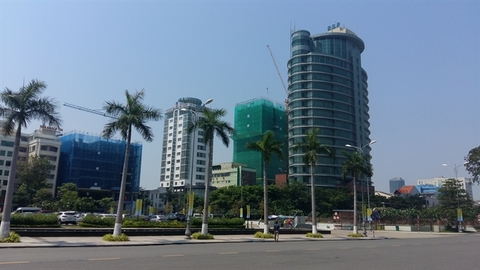
A building of Da Nang Software Park in the downtown area. The city began construction of the second software park in drawing investment in the information technology and electronics as well as high-tech industries. — VNS Photo Cong Thanh
Da Nang has commenced construction of the city's second software park, aiming to boost the key export industry and build Da Nang into a ‘smart city’ in 2025.
The city’s information and communications department said the park will be built on 2.87ha with an investment of VND704 billion (US$30.6 million) for the first phase.
It is expected to be the workplace for 6,000 IT engineers by 2023.
Da Nang currently has two centralised information technology zones, namely the Da Nang Software Park and Da Nang IT Park, drawing 1,900 businesses working in IT and communications industry with revenue of more than $1.2 billion each year.
The key industry also contributes 5.5 per cent to the city’s gross regional domestic product (GRDP) annually, and it will account for 15 per cent by 2030, according to the department.
The Da Nang IT Park on 341ha was designed as a ‘Silicon Valley’ in central Viet Nam and has attracted investment from Taiwan, South Korea, Thailand and Japan.
The park is expected to create revenue of $1.5 billion each year with 25,000 jobs and an urban area for 100,000 people from 2030.
Electronics centre
Also on the occasion, the Da Nang Information Technology Park (DITP) JSC company launched the first surface-mount technology (SMT) factory at Da Nang Hi-tech Park after three months of construction, offering an attraction to other high-tech industries investors from domestic and foreign countries to the city.
General director of the DITP company, Nguyen Anh Huy, said the factory will begin manufacturing printed circuit boards and electronic components for export later this month before entering mass production from 2021.
Huy said the SMT factory will be provided with a complex of research and development centre, electronic component production, high-quality human resources incubation and training centre in the years to come.
It plans to build more 17 factories in IT, electronics, high-tech industries and supportive industries. — VNS